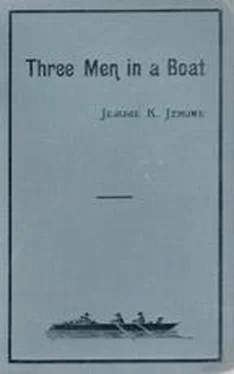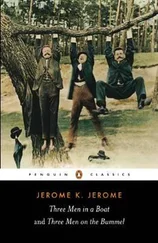George has never learned to play the banjo to this day. He has had too much all–round discouragement to meet. He tried on two or three evenings, while we were up the river, to get a little practice, but it was never a success. Harris's language used to be enough to unnerve any man; added to which, Montmorency would sit and howl steadily, right through the performance. It was not giving the man a fair chance.
«What's he want to howl like that for when I'm playing?» George would exclaim indignantly, while taking aim at him with a boot.
«What do you want to play like that for when he is howling?» Harris would retort, catching the boot. «You let him alone. He can't help howling. He's got a musical ear, and your playing MAKES him howl.»
So George determined to postpone study of the banjo until he reached home. But he did not get much opportunity even there. Mrs. P. used to come up and say she was very sorry — for herself, she liked to hear him — but the lady upstairs was in a very delicate state, and the doctor was afraid it might injure the child.
Then George tried taking it out with him late at night, and practising round the square. But the inhabitants complained to the police about it, and a watch was set for him one night, and he was captured. The evidence against him was very clear, and he was bound over to keep the peace for six months.
He seemed to lose heart in the business after that. He did make one or two feeble efforts to take up the work again when the six months had elapsed, but there was always the same coldness — the same want of sympathy on the part of the world to fight against; and, after awhile, he despaired altogether, and advertised the instrument for sale at a great sacrifice — «owner having no further use for same» — and took to learning card tricks instead.
It must be disheartening work learning a musical instrument. You would think that Society, for its own sake, would do all it could to assist a man to acquire the art of playing a musical instrument. But it doesn't!
I knew a young fellow once, who was studying to play the bagpipes, and you would be surprised at the amount of opposition he had to contend with. Why, not even from the members of his own family did he receive what you could call active encouragement. His father was dead against the business from the beginning, and spoke quite unfeelingly on the subject.
My friend used to get up early in the morning to practise, but he had to give that plan up, because of his sister. She was somewhat religiously inclined, and she said it seemed such an awful thing to begin the day like that.
So he sat up at night instead, and played after the family had gone to bed, but that did not do, as it got the house such a bad name. People, going home late, would stop outside to listen, and then put it about all over the town, the next morning, that a fearful murder had been committed at Mr. Jefferson's the night before; and would describe how they had heard the victim's shrieks and the brutal oaths and curses of the murderer, followed by the prayer for mercy, and the last dying gurgle of the corpse.
So they let him practise in the day–time, in the back–kitchen with all the doors shut; but his more successful passages could generally be heard in the sitting–room, in spite of these precautions, and would affect his mother almost to tears.
She said it put her in mind of her poor father (he had been swallowed by a shark, poor man, while bathing off the coast of New Guinea — where the connection came in, she could not explain).
Then they knocked up a little place for him at the bottom of the garden, about quarter of a mile from the house, and made him take the machine down there when he wanted to work it; and sometimes a visitor would come to the house who knew nothing of the matter, and they would forget to tell him all about it, and caution him, and he would go out for a stroll round the garden and suddenly get within earshot of those bagpipes, without being prepared for it, or knowing what it was. If he were a man of strong mind, it only gave him fits; but a person of mere average intellect it usually sent mad.
There is, it must be confessed, something very sad about the early efforts of an amateur in bagpipes. I have felt that myself when listening to my young friend. They appear to be a trying instrument to perform upon. You have to get enough breath for the whole tune before you start — at least, so I gathered from watching Jefferson.
He would begin magnificently with a wild, full, come–to–the–battle sort of a note, that quite roused you. But he would get more and more piano as he went on, and the last verse generally collapsed in the middle with a splutter and a hiss.
You want to be in good health to play the bagpipes.
Young Jefferson only learnt to play one tune on those bagpipes; but I never heard any complaints about the insufficiency of his repertoire — none whatever. This tune was «The Campbells are Coming, Hooray — Hooray!» so he said, though his father always held that it was «The Blue Bells of Scotland.» Nobody seemed quite sure what it was exactly, but they all agreed that it sounded Scotch.
Strangers were allowed three guesses, and most of them guessed a different tune each time.
Harris was disagreeable after supper, — I think it must have been the stew that had upset him: he is not used to high living, — so George and I left him in the boat, and settled to go for a mouch round Henley. He said he should have a glass of whisky and a pipe, and fix things up for the night. We were to shout when we returned, and he would row over from the island and fetch us.
«Don't go to sleep, old man,» we said as we started.
«Not much fear of that while this stew's on,» he grunted, as he pulled back to the island.
Henley was getting ready for the regatta, and was full of bustle. We met a goodish number of men we knew about the town, and in their pleasant company the time slipped by somewhat quickly; so that it was nearly eleven o'clock before we set off on our four–mile walk home — as we had learned to call our little craft by this time.
It was a dismal night, coldish, with a thin rain falling; and as we trudged through the dark, silent fields, talking low to each other, and wondering if we were going right or not, we thought of the cosy boat, with the bright light streaming through the tight–drawn canvas; of Harris and Montmorency, and the whisky, and wished that we were there.
We conjured up the picture of ourselves inside, tired and a little hungry; of the gloomy river and the shapeless trees; and, like a giant glow–worm underneath them, our dear old boat, so snug and warm and cheerful. We could see ourselves at supper there, pecking away at cold meat, and passing each other chunks of bread; we could hear the cheery clatter of our knives, the laughing voices, filling all the space, and overflowing through the opening out into the night. And we hurried on to realise the vision.
We struck the tow–path at length, and that made us happy; because prior to this we had not been sure whether we were walking towards the river or away from it, and when you are tired and want to go to bed uncertainties like that worry you. We passed Skiplake as the clock was striking the quarter to twelve; and then George said, thoughtfully: «You don't happen to remember which of the islands it was, do you?»
«No,» I replied, beginning to grow thoughtful too, «I don't. How many are there?»
«Only four,» answered George. «It will be all right, if he's awake.»
«And if not?» I queried; but we dismissed that train of thought.
We shouted when we came opposite the first island, but there was no response; so we went to the second, and tried there, and obtained the same result.
«Oh! I remember now,» said George; «it was the third one.»
Читать дальше












